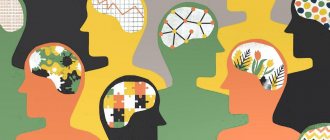The beginning of life's journey
During the first years of life, certain skills are formed, the child learns more and more new techniques, reaching a certain level of development in one direction or another.
Gradually, one type of activity replaces another, but the previous stage cannot be considered separate and not related to future development. This is always a “superstructure” on previous experience.
Thus, activity runs like a “red thread” along a person’s life path, shaping and improving it.
Important points in the emergence of personal qualities
How can one influence a person’s successful development in life, based on the factors and prerequisites for personal development? Very simple! Try to make his stay in society as comfortable as possible and provide him with help in self-realization.
Improving outside influence
If we take into account external reasons, then it is worth trying to surround the person with due attention and care, try to give her the right upbringing and provide an adequate environment whose behavior can be compared to.
Here, the main development begins in childhood, and largely depends on the work of parents, relatives and teachers. Because of mistakes in the spiritual education of children, their happy future often collapses or complexes arise that prevent them from realizing themselves in society.
As for a more mature age, self-improvement will require much more strength and courage, because you will have to radically reconsider some of your actions and understand whether they are correct or require some adjustments.
Strict self-discipline
If we take internal individual reasons, then there is little that can be done to influence the individual. After all, self-education, discipline and internal control of the person himself play a significant role here. In this case, all responsibility for restructuring his thoughts and actions, and his entire perception of the world as a whole, falls squarely on his shoulders.
By being closely involved in raising a child from his very birth, you can help him gain some internal “engines” in understanding the world and increase his perceptual activity. This is done through educational games, teaching him to work and help adults.
Any genetic feature is your unique highlight
As for the biological factors of development and personality formation, it is worth taking into account the genetic characteristics and prerequisites of the individual. To be more precise, it is worth taking care in advance to ensure that some hereditary diseases do not worsen or, in principle, do not make themselves felt.
Here we need prevention and more careful care of health and mental state. If you look from a positive point of view, then it is best to develop positive genetic predispositions on the contrary. Over time, these abilities can be transformed into talent and help in a person’s self-realization.
The role of public opinion in the emergence of personality
The social environment plays an important role in the emergence of individuality. Each of us lives in society, so we need to learn how to interact with it. To be realized here, you will need developed communication skills. They can be easily achieved through frequent direct communication with people around you. In childhood, this can be communication with parents, and subsequently with teachers and friends.
This factor in human personality development can also be improved in adulthood. For example, reconsider your social circle, using observation methods to understand how it influences you and whether it brings the development that you strive for. The social factor consists of the influence of society on a person. This may be the political situation in the country where the individual lives, or his religious preferences, the influence of the media and social norms and orders.
Personality education and characteristics of age stages
In psychological science, the problem of personality development and education is quite relevant. This is connected both with the social aspects of society and with biologically determined processes.
At different time periods, either a theory in which biological significance in the process of personality development was a priority, or a social theory, according to which personality is formed under the influence of society, came to the fore.
Domestic psychology, as the main driving forces of personality development, has put forward a theory about the significance of obstacles to “growing up.” Such obstacles are called crises, through which a person receives a certain new formation and the ability to move to a new level of development.
A prominent representative of this approach is L.S. Vygotsky. It was he who introduced into developmental psychology the concept of the zone of proximal development and the significance of age-related crises. In his theory, a significant role was assigned to age periodization and the specificity of each period.
In order for the development of a child’s personality to proceed harmoniously and as efficiently as possible, those around him must know the characteristics of each age stage and be able to identify possible developmental deviations in time, because psychological age often does not coincide with calendar age.
Preschool period
Preschool children are curious and active. Their main activity is play.
In the first stages, the child requires the help of an adult, his participation and support. It is during this period that an important development mechanism manifests itself - imitation. A small personality strives to repeat the behavior of those around him in everything. Most often, parents and close circle are subject to “copying”.
At this age, the child does not yet have and does not know how to express his opinion, he has not developed an empathy feedback mechanism, so imitation of an adult is precisely in the nature of repetition, and repetition of actions or words of a different nature, both positive and negative.
School period
School-age children and teenagers are already able to distinguish between the positive and negative aspects of adult behavior. They are more independent, their intellectual level is at a higher level. In addition, the formation of critical thinking plays an important role at this stage of development.
Read more: Developing critical thinking
In adolescence, the activity of cognitive activity is quite high, so it is important that at this stage of development the child has as many positive examples of development as possible, otherwise an impressive negative experience can become a decisive factor in the line of personal development.
The activity of a preschooler as a whole comes down to learning to serve himself independently and preparing for school. At this stage, the emergence and improvement of speech skills, as well as the ability to think and draw logical conclusions, becomes an important new development.
Already in this period, children are able to carry out simple work assignments for adults, as well as master primary skills of behavior in a social environment.
Gradually, play activities begin to be replaced by educational activities. At primary school age, speech skills deepen, knowledge appears, which the child perceives not only from a personal position, but also from the side of the team. Independence of behavior is being formed. Younger preschoolers tend to be actively involved in work activities, because they already understand its importance and necessity.
During adolescence, activity levels reach almost maximum levels. The desire for knowledge increases significantly against the background of progressive mental development. Teenagers are inquisitive and focused on the future. However, a positive attitude must be supported by positive factors. Otherwise, there is a high probability that the perception of the surrounding world and activities will be formed in a distorted form.
Period of adolescence
The period of adolescence is aimed at friendships, their formation and strengthening. At this age, a person is characterized by persistent strong-willed qualities, aspirations to master and improve himself in the profession and the desire to meet a life partner.
The influence of upbringing on personality development
Education is the main force that can give society a full-fledged personality. The effectiveness of educational influence lies in purposefulness, systematicity and qualified leadership. The role of education is assessed in different ways - from the assertion of its complete powerlessness and meaninglessness (with unfavorable heredity and the bad influence of the environment) to the recognition of it as the only means of changing human nature. You can achieve a lot through education, but you cannot completely change a person.
Education subordinates human development to the intended goal.
Education is about filling the gaps in the human development program. One of the most important tasks of properly organized education is to identify inclinations and talents, development in accordance with the individual characteristics of a person, his abilities and capabilities.
Special studies have shown that education can ensure the development of certain qualities only by relying on the inclinations inherent in nature. Influencing human development, education itself depends on development; it constantly relies on the achieved level of development.
The strength of educational influence depends on a number of conditions and circumstances. Domestic teacher and psychologist L.S. Vygotsky substantiated the pattern according to which the goals and methods of education must correspond not only to the level of development already achieved by the child, but also to the “zone of proximal development.” Only that upbringing is recognized as good, which goes ahead of development. Personality is formed by upbringing, which leads to development, focusing on processes that have not yet matured, but are in the process of formation.
The influence of activity on personality development
Activity refers to the whole variety of human activities, everything that he does.
In the process of activity, a comprehensive and holistic development of a person’s personality occurs, and his attitude towards the world around him is formed. The biggest challenge lies in the reasonable organization and direction of activities.
The main activities of children and adolescents are play, learning, and work. According to their orientation, cognitive, social, sports, artistic, technical, craft, and hedonic (directed at obtaining pleasure) activities are distinguished.
Activities can be active or passive.
Activity in learning allows the student to quickly and more successfully master social experience, develop communication skills, and form an attitude towards the surrounding reality. Cognitive activity ensures the intellectual development of the child. It is characterized not only by the need to solve cognitive problems, but also by the need to apply acquired knowledge in practice.
Labor activity stimulates the rapid and successful formation of the spiritual and moral world of the individual, determines the willingness to work hard and successfully. All manifestations of activity have the same constant source - needs. The variety of human needs gives rise to a variety of activities to satisfy them.
The activity of a person himself is an indispensable condition for the development of his abilities and talents, and for achieving success.
studfiles.net
Personal development in the process of activity
Work occupies a significant place in the life of every person, no matter whether the work is intellectual or physical.
Personal development in the process of work begins from the moment of mastering the tools, means and results of labor.
The knowledge acquired by a person in the process of mastering professional skills has a significant impact on the formation of the worldview of the individual as a whole.
The success of work activity depends on several factors, the main of which are the involvement of the individual himself and his ability to interact collectively.
It is also important to take into account the personality of the mentor who guides the individual along the path of development.
The role of labor in the process of personal development
Work develops abilities and shapes thinking. The involvement of the individual in the labor process leads to a change in worldview and attitude. A person sees himself in a new image, and the entire world around him takes on a new meaning.
The communicative side of work activity influences the emotional and sensory sphere of the individual. In a team, a person can express himself in a new way, using actions and actions that are unusual for his everyday behavior. Gradually expanding the circle of communication due to inclusion in more and more new types of activities, the individual goes through more and more new stages of socialization.
Psychological foundations of activity and personality
The main condition for the harmonious development of personality is activity.
In the most general understanding of the word, activity means an individual’s focus on some kind of activity, both internal and physical. The uniqueness of the human psyche lies, first of all, in the ability to implement one’s actions in the head, which is a distinctive psychological feature. The psychological foundations of activity arise in childhood, when the child first learns to perform an action, and then is able to perform the same operation in his mind, while new abilities are gradually added, transforming objective activity into internal activity. As a result of this feature of the psyche, a person can use both his own knowledge and the experience of past generations of people. If we talk about the structure of human activity, the main elements here are:
- Goal is a conscious desire to achieve the final result;
- Motives - explain the reasons why a person wants to achieve a certain goal, which encourages a person to move according to the intended plan;
- Action implies the systematic implementation of current tasks that arise in the process of achieving the intended goal.
A change in the structure of the activity of an object image in the human psyche indicates a lack of conscious activity, i.e. the personality acts guided only by instincts, in this case they speak of the impulsive behavior of the individual.











